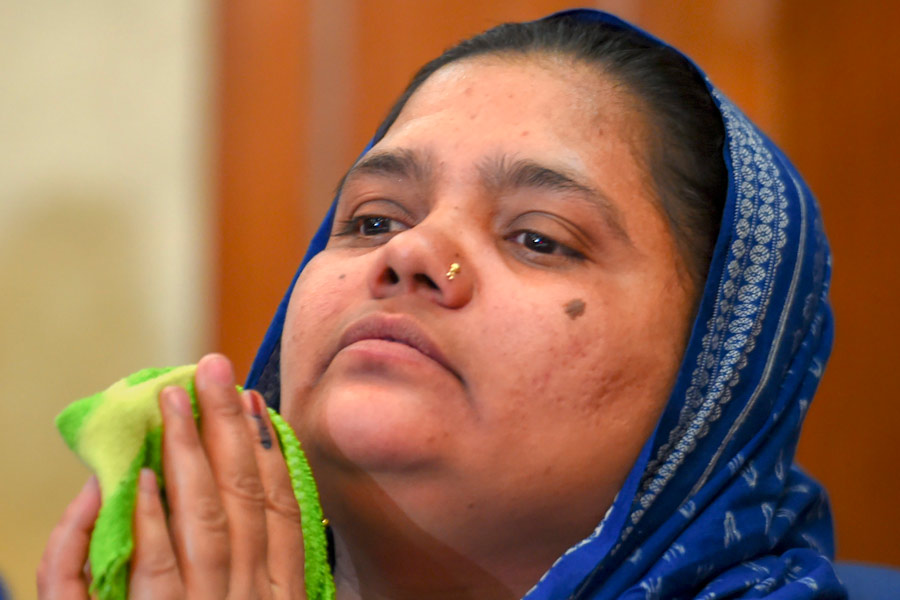The Supreme Court on Thursday upheld its January 8 judgment quashing the release of the 11 lifers in the Bilkis Bano gang rape and murder, handing the
Gujarat government and the convicts their latest setback in a case that encapsulates the horror of the 2002 riots.
The apex court dismissed Gujarat’s review petition that sought the expunction of certain scathing observations in the January 8 judgment about the state government’s conduct in remitting the sentences and releasing the convicts. It also rejected the convicts’ review plea that challenged the entirety of the January 8 verdict.
The 11 lifers have been convicted of murdering 12 members of Bilkis’s family, including her three-year-old daughter, and gang-raping three women — including the pregnant Bilkis — during the 2002 Gujarat riots.
The Gujarat government remitted their sentences and released them on August 15, 2022 — the 75th anniversary of India’s independence — triggering nationwide outrage that was exacerbated by images of the convicts being garlanded on release.
“Delay in filing the R.P. (review petition)… is condoned. Application for listing Review Petition in open court is rejected,” the bench of Justice B.V. Nagarathna and Justice Ujjal Bhuyan said in a brief order uploaded on Thursday evening.
“…We are satisfied that there is no error apparent on the face of the record or any merit in the Review Petitions, warranting reconsideration of the order impugned.”
The convicts can now apply for premature release before the government of Maharashtra, where they were tried before being jailed in Gujarat. Or they and the Gujarat government can approach the apex court with a curative
petition, a last resort that historically offers little possibility of success.
After Bilkis and several social activists challenged the Gujarat government’s move, the apex court bench of Justice Nagarathna and Justice Bhuyan quashed the convicts’ release on January 8 and asked them to surrender in two weeks.
It ruled that the government of Maharashtra — where the case had been transferred on an earlier apex court directive — alone had the power to decide on remission.
It castigated the Gujarat government for acting without jurisdiction, saying it had “usurped” the Maharashtra government’s powers.
The January 8 judgment also slammed one of the convicts, Radheshyam Bhagwandas Shah, for having earlier obtained a favourable order from a different apex court bench through “fraud”.
On a plea from Radheshyam, a Supreme Court bench had on May 15, 2022, directed the Gujarat government to consider his application for release under the state’s remission policy of 1992 that was in force at the time of his conviction.
It was on the basis of this judgment that remissions were granted to all 11 convicts. But the January 8,2024, judgment declared the May 15, 2022, verdict as “per incuriam (decided on wrong facts)”.
After the January 8 judgment, the Gujarat government sought an extension of the two-week deadline for surrender citing family, health and other problems, but was refused. It later moved the review petition, arguing that it had the power to grant remission.
Among the petitioners who had challenged the August 2022 remissions were former woman IPS officer Meeran Chadha Borwankar, CPI leader Subhashini Ali, Trinamool Congress MP Mahua Moitra, and lawyer and social activist Asma Shafique Shaikh, among others.
In court, the Gujarat government had argued that barring Bilkis, the other petitioners had no locus standi and their petitions were motivated by political and personal interests.
The January 8 judgment said: “In our view, on a plain reading of sub-section (7) of Section 432 of the CrPC and considering the judgments of this Court, it is the State of Maharashtra, which had the jurisdiction to consider the application for remission vis-à-vis respondent Nos. 3 to 13 herein as they were sentenced by the Special Court, Mumbai.
“When an authority does not have the jurisdiction to deal with a matter or it is not within the powers of the authority i.e. the State of Gujarat in the instant case, to be the appropriate Government to pass orders of remission under Section 432 of the CrPC, the orders of remission would have no legs to stand.”











